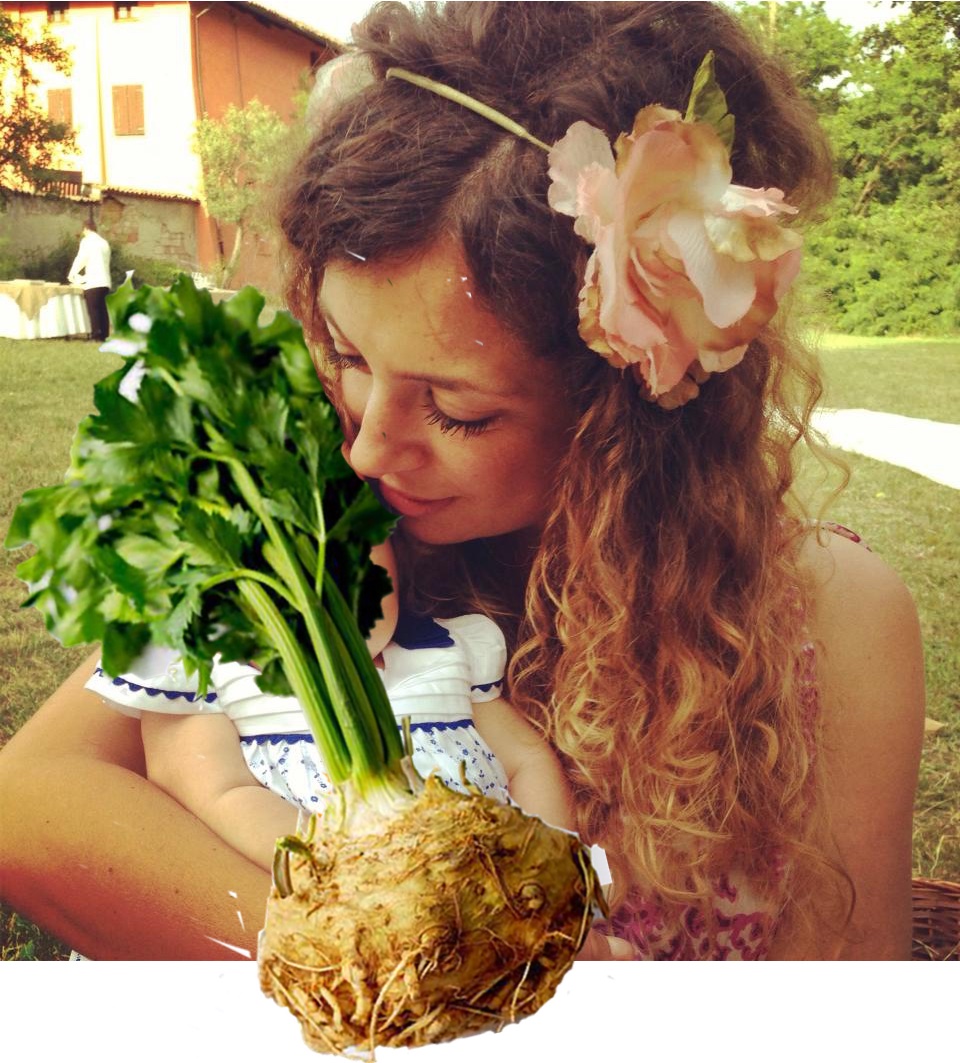La patata inglese come non l'avete mai vista
Daria e il celeriac (sedano rapa)
Per tre anni ho creduto che celeriac fosse il sedano (celery), ma pronunciato male. Anche perché di tuberi esotici ne avevo già visti abbastanza nel poco esotico Regno Unito dove pensavo esistessero solo patate (mio padre ancora mi domanda ogni volta che viene a trovarmi: ma dove li prendono i pomodorini e le clementine? In Spagna papà). Insomma quando credevo di avere ormai una mappa precisa di tutte le sfumature del tubero britannico arriva la mia amica Marie e mi rivela che no, il celeriac non è il sedano, ma il “sedano rapa”, (grazie Google translate). Una sorta di incrocio tra un porro gigante e un cavolo nella forma dell’esplosione della bomba atomica su Hiroshima. Tra le altre verdure aliene:
- Sweet potato, in Italia la chiamiamo ossequiosamente patata americana e la snobbiamo nonostante, dice, non faccia ingrassare quanto la cugina patata semplice. Ovviamente per annullarne l’effetto salutare nei pub inglesi viene fritta a dovere.
- Butternut squash, insipida versione della zucca con la forma di una pera gigante. Oltre a rimettere ogni volta in discussione le mie capacità di spelling, la sua inutilità viene riscattata solo al forno con formaggio di capra e rosmarino.
- Parsnip. Pastinaca. Mega carotona bianca. Tagliata di lungo in quattro spicchi che solitamente finiscono nel famoso Sunday Roast, l’arrosto della domenica (che è un po’ come il nostro ragù… ma anzi no);
- Swede, ovvero rutabaga (che per quel rincoglionito di Google translate è “lo svedese”). Non ne ho assolutamente capito la funzione. La gente lo nasconde nelle zuppe quando lo deve smaltire dopo averlo trovato nel pacco di tuberi assortiti di Waitrose.
- Okra, una specie di peperoncino verde appiccicoso coltivato nell’Africa occidentale come nel sud dell’Asia e di cui il Regno di Sua Maestà si è appropriato ribattezzandolo Ladies fingers.
- Pak Choi, manco questo è britannico, ma giappo-cinese. Un incrocio tra l’insalata belga e il finocchio. Resterà sempre nel mio cuore quello cucinato alla trattoria cinese Hua Cheng di Milano.
E poi ci sono quelli che manco il mio Afro-britannico conosce: Dudhi, Mooli, Turnip, Eddoe, Yam, Cassava. Di solito quando nei negozi di verdure chiedo: ma che è? Mi rispondono: patata._TIW
The British potato, as you have never seen it before
Dudhi and red bananas
For three years I believed that celeriac was just celery but mispronounced, because I had already seen enough exotic tubers in this not so exotic country where I originally thought you could only get potatoes (every time my dad visits he asks "but where do they grow tomatoes and clementines here?" In Spain dad).
So, when I thought I had a precise map of all the nuances of British tubers, my friend Marie tells me that no, celeriac is not the same as celery. It is actually a sort of cross between a giant leek and cabbage in the form of the explosion of the atomic bomb on Hiroshima. Other alien vegetables:
- Sweet potato: in Italy obsequiously we call it an American potato and are snobbish about it despite the fact , they say, it is not as fatty as its simple cousin potato potato. Obviously to cancel the salutary effect it is deep fried in pubs.
- Butternut squash: tasteless variant of the pumpkin, with the shape of a giant pear. In addition to questioning my ability to spell every time, its futility is redeemed only when baked with goat cheese and rosemary.
- Parsnip: mega white carrot cut down into four segments - but you better get a degree in Engineering for that - that usually end up in the famous Sunday Roast (which is a bit ' like our ragù sauce ... but nay).
- Swede: I have no idea of its function. People seem to hide it in soups to dispose of it after finding it in the Waitrose assorted tubers pack .
- Turnip: ditto but even harder to dispose of.
- Okra: a kind of sticky green chilli grown in West Africa and in South Asia, renamed by the colonisers as Ladies fingers.
- Pak Choi: this isn’t British either but Japanese-Chinese. A cross between endives and fennel. It will always remain in my heart the one cooked at the Trattoria Cinese Hua Cheng in Milan.
And then there are those that not even my Afro-British half knows: Dudhi, Mooli, Eddoe, Yam, Cassava. Usually when in vegetable stores I ask: but what is it? The answer is: potato._TIW


